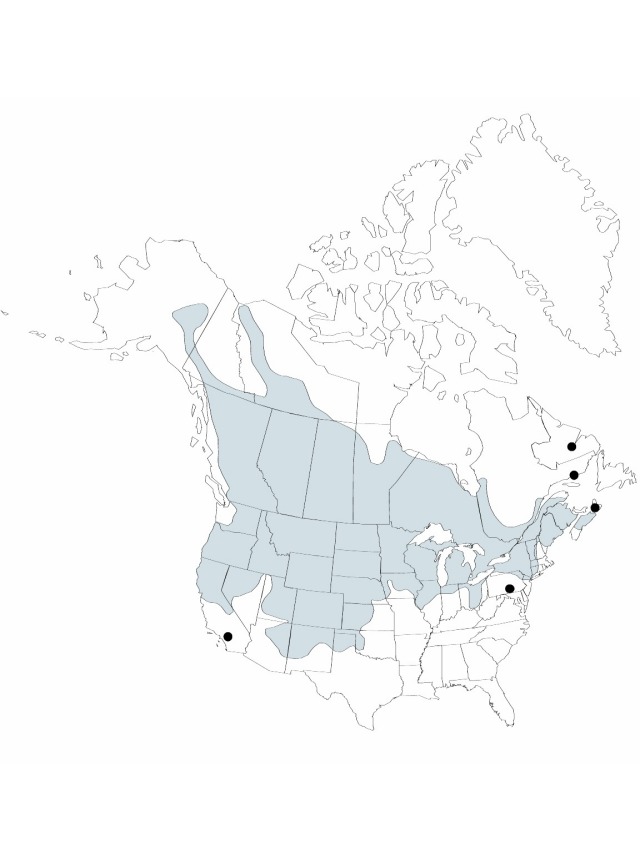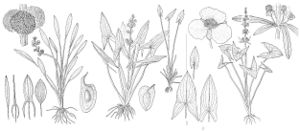Sagittaria cuneata
Bulletin of the Torrey Botanical Club 20:283, plate 159. 1893.
Herbs, perennial, to 110 cm; rhizomes absent; stolons present; corms present. Leaves emersed, floating, and submersed; submersed phyllodial, flattened, to 45 cm; floating with petiole triangular, to 100 cm, blade cordate or sagittate, rarely linear or ovate, 7.5–9 × 3.5–4 cm; emersed with petiole recurved, 3.5–51 cm, blade linear to sagittate, 2.5–17 × 1.5–11 cm, basal lobes when present shorter than remainder of blade. Inflorescences racemes, rarely panicles, of 2–10 whorls, emersed, 14–21 × 2–10 cm, peduncle triangular, 10–50 cm; bracts connate more than or equal to ¼ total length, lance-attenuate or acute, mostly (4–)7–40 mm, membranous, not papillose; fruiting pedicels ascending, cylindric, 0.5–2 cm. Flowers to 25 mm diam.; sepals recurved, not enclosing flower or fruiting head; filaments not dilated, equal to or longer than anthers, glabrous; pistillate pedicellate, without ring of sterile stamens. Fruiting heads 0.8–1.5 cm diam.; achenes obovoid, abaxially keeled, 1.8–2.6 × 1.3–2.5 mm, beaked; face not tuberculate, wings 0–1, ± entire, glands 0–1; beak apical, erect, 0.1–0.4 mm. 2n = 22.
Phenology: Flowering late spring–summer (Jun–Sep).
Habitat: Calcareous and muddy shores and shallow waters of rivers, lakes, ponds, pastures, and ditches, occasional in tidal waters, or in deep flowing water with slow current
Elevation: 100–2500 m
Distribution

Alta., B.C., Man., N.B., Nfld. and Labr. (Labr.), N.W.T., N.S., Ont., Que., Sask., Yukon, Alaska, Ariz., Calif., Colo., Conn., Idaho, Ill., Ind., Iowa, Kans., Maine, Mass., Mich., Minn., Mont., Nebr., Nev., N.H., N.J., N.Mex., N.Y., N.Dak., Ohio, Okla., Oreg., Pa., S.Dak., Tex., Utah, Vt., Wash., Wis., Wyo.
Discussion
Sagittaria cuneata is extremely variable. On emersed plants, the leaf petioles are often bent toward the ground. Submersed plants often grow from a basal rosette with a long flexuous petiole and a floating sagittate leave. Plants in deep rivers often develop broad, straplike phyllodia.
Selected References
None.
